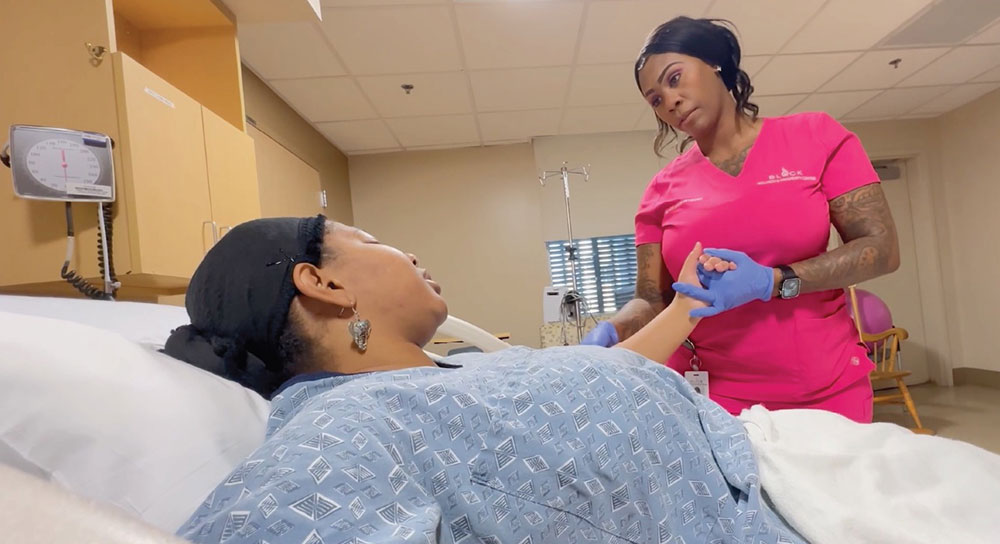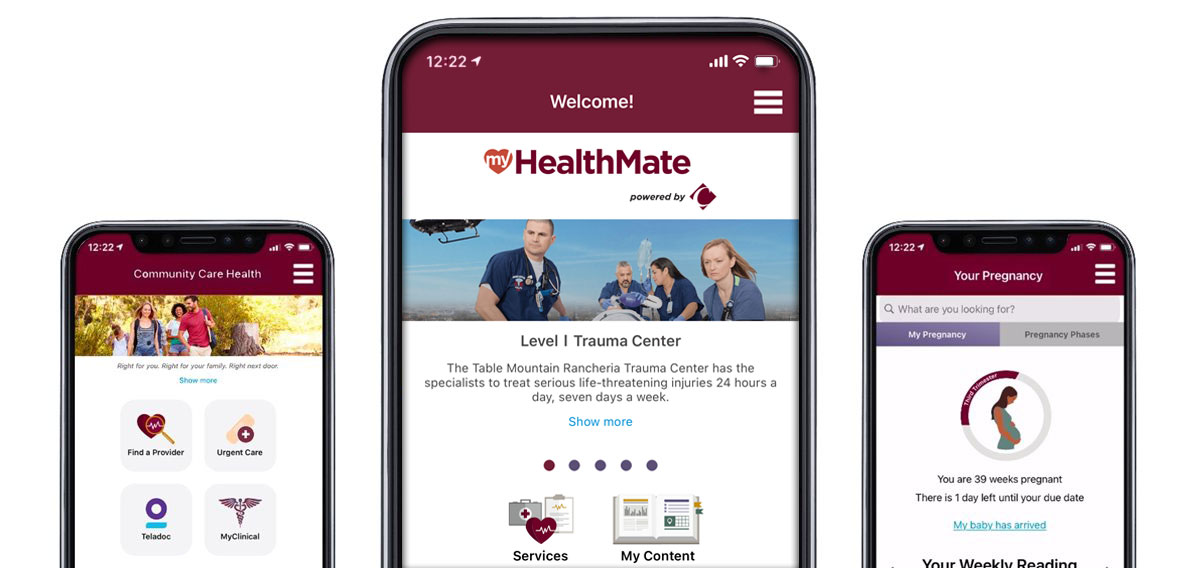
Pregnancy is a time of wonder, with each day bringing new discoveries and experiences. We want to make sure you're equipped with answers whenever you have questions, and resources whenever you need help. On this page, you'll find information about the following topics:
Welcoming Doulas into Community Hospitals
We're so proud to work with local doulas, who we consider to be part of your healthcare team, helping to create a more relaxed birthing experience for you whether you deliver at Clovis Community or Community Regional medical centers.
What is a doula?
Simply put, a doula is a helpful guide who's there to improve your experience — before, during and after childbirth.
Doulas are professionally trained in childbirth but are non-clinical, meaning they can't give medical advice or perform medical procedures. What they can do is:
- Act as a link between you and your medical care team, explaining to your physician and nursing staff your birth plan and advocating for your needs so you can focus on having a great birth experience
- Give you information about the procedures and actions performed, easing any uncertainty or worry
- Be a source of physical comfort to you, guiding you through breathing exercises and administering massage in an effort to reduce stress and anxiety for you and your baby
- Provide support and encouragement to you and your partner, spouse or loved ones
 Why are doulas important?
Why are doulas important?
There are many benefits to having a doula assist you throughout the pregnancy journey. Studies have shown that doulas help decrease cesarean rates, the length of labor, and even pain medication use.
Having someone in the room who's there for your needs, to make your experience the best it can be, is a source of comfort for many mothers and their partners. Postpartum, a doula can help with feeding, newborn care and providing emotional support.
Finding a doula
While we welcome doulas into our delivery rooms, Community doesn't have doulas on staff. Talk to your healthcare provider about how to find a doula that works for you. In some cases, doula assistance may even be covered by Medi-Cal.
Or, you can search the California Department of Health Care Services doula directory by county to find a doula in your area.
Our Free, Online Parent Education Series
We're pleased to offer expectant parents our online education series, which details everything you need to know to prepare for your childbirth experience at Community. Register for the series using the form below and we'll send you a link for a video tour of our birthing facilities at Clovis Community and Community Regional.
You'll also receive links to view all of our prepared childbirth virtual classes:
- Exploring Registration
- Understanding Labor & Birth
- Identifying Stages of Labor
- Handling Labor Pain & Comfort Measures
- Applying Labor Pain & Comfort Measures
- Identifying Labor & Birth Interventions
- Understanding Cesarean Birth
- Caring for Yourself Postpartum
- Experiencing Your Amazing Newborn
- Learning About Breastfeeding
Track Your Pregnancy with the Free MyHealthMate App
Whether you choose to deliver your baby at Community Regional or Clovis Community, we have tools to help you prepare.
Our free mobile app, MyHealthMate, is powered by MyChart and allows you to access your health information plus navigate our online health system and services — all in one convenient place.
By using MyHealthMate, you can access a customized pregnancy tracker, weekly facts about baby’s growth, related articles and other tools such as:
- Kick counter
- Hospital packing list
- Contraction timer
- Diaper and feeding log
During your hospital stay, MyHealthMate will also allow you to view medications, lab results, and even names and photos of your care team. Learn more and sign up today.
YoMingo® Provides Education from Pregnancy through the First Year
Another free, online support tool we recommend using is YoMingo®. This extensive tool helps you stay organized during and after your pregnancy.
YoMingo® includes educational content on a wide variety of topics intended to help guide you through pregnancy, labor and birth, postpartum, breastfeeding and newborn care — all in multiple languages! Plus, you can make use of fun and helpful tools such as:

- Weekly milestones
- Kick counter
- Packing list
- Contraction timer
- Feeding log
- Diaper log
- Measurements
- Appointments calendar
- Immunization log
- Journal
Free Pre- and Postpartum Pelvic Health Classes
The pelvic floor is a region in the body that consists of a group of bones and joints that make up the pelvic girdle, and a group muscles that act like a hammock to support our pelvic organs, aid in sexual satisfaction, aid in bowel and bladder control, stabilize our core and act like a sump pump to help with circulation.
Our free pelvic floor classes are conducted over Zoom and are led by pelvic floor specialist Elizabeth A. Maskell, PT, DPT. They are available to any pregnant person who is pre-birth, and for those who are in postpartum recovery, regardless of where they deliver.
For details on how to join, call (559) 324-4057.
Preparing Your Pelvic Floor for Birth
Class covers:
- Pelvic floor preparation and coordination
- How to push, breathe and open your pelvis during labor
- Reducing risk for tearing
- How to exercise safely during pregnancy
Classes take place from 3 to 4 p.m. on the following Wednesdays:
- March 12, 2025
- May 14, 2025
Postpartum Recovery
Class covers:
- Pelvic floor and core retraining
- Pressure management techniques to protect the pelvic floor
- Back pain reduction and improper posture
- How to exercise safely during the postpartum phase
Classes take place from 3 to 4 p.m. on the following Wednesdays:
- February 5, 2025
- April 9, 2025
Learn More About Pelvic Floor Health
Community Medical Centers' Elizabeth Maskell explains the importance of pelvic floor health and describes her work helping patients who are either preparing to give birth — or have already given birth — improve their pelvic floor muscles.
Mental Health Resources
Perinatal depression is something that can affect any pregnant person — no matter their age, race, culture or preparedness and excitement for being a parent. It can happen during pregnancy or postpartum, up through your child's first year.
Symptoms may include things like:
- Feeling sad, angry, overwhelmed or experiencing mood swings
- Lack of interest in things you once enjoyed
- Excessive worry about the baby
- Thoughts of self-harm, or of harming your baby
- Feeling guilty or inadequate
- Having a hard time accepting that you're a parent
- Seeing or hearing things that aren't there
You should know that experiencing depression doesn't make you weak, ungrateful or a bad parent. It is absolutely not your fault.
The good news is that perinatal depression is treatable. You don't have to suffer. Help is available if you or your partner (who also may experience symptoms) need it.
List of Mental Health Resources
If you’re experiencing any of these symptoms, first talk with your doctor. For additional help, visit one of these organizations:
Fresno County Maternal Mental Health Resources Perinatal Wellness Center
Maternal Wellness Program
Department of Behavioral Health Access Line
National Alliance on Mental Illness (NAMI) Fresno
Exodus Recovery Crisis Center
Postpartum Support International
1 (800) 944-4773 or www.postpartum.net
Pregnancy Care Center Services for Men
(559) 237-0683 or www.pregnancycarecenter.com/for-men
Project DAD (Madera County only)
www.healthcollaborative.org/program/project-dad/
Resources for Substance Use
Fresno First
Westcare
Rescue the Children
We use cookies and other tools to optimize and enhance your experience on our website. View our Privacy Policy.


